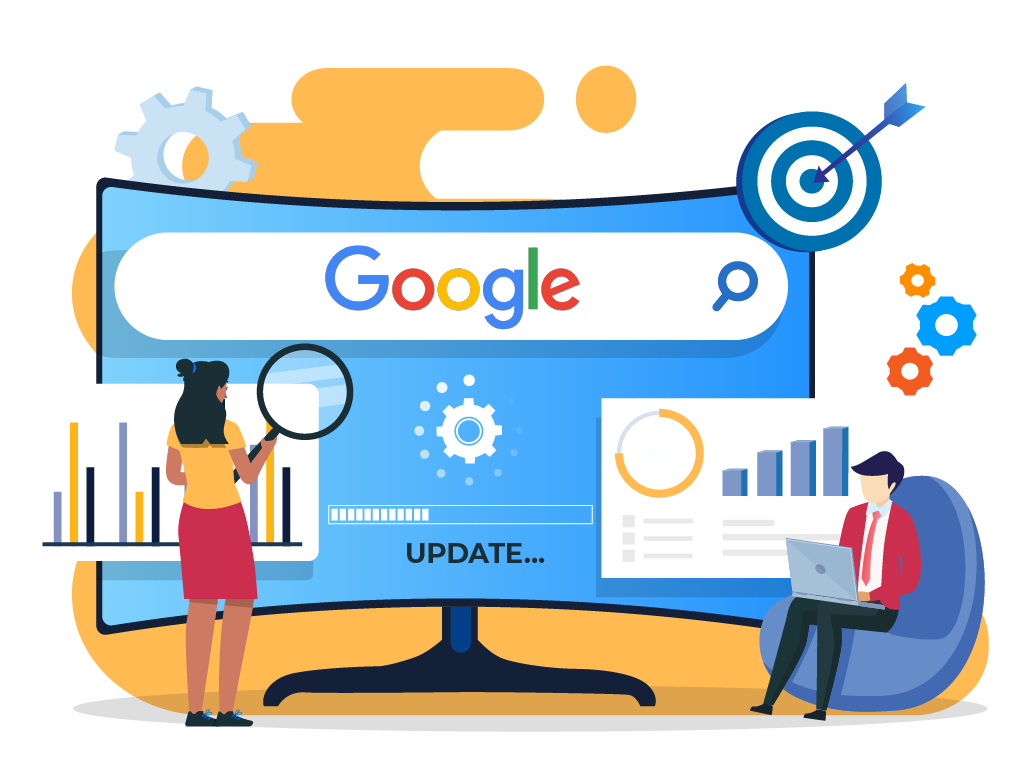Amid the rapid evolution of online search, keeping pace with Google’s constant evolution is important for businesses and marketers alike. Throughout 2023, Google rolled out an astounding 4,725 changes to its search algorithms, interface, and systems, which makes an average of 13 updates per day.
But the real story goes beyond these figures. For those involved in experiments, the rate of change can be even more intense. Google conducted a significant 13,280 live traffic experiments, along with 894,660 search quality tests and 148,038 side-by-side experiments in the same year. While many of these adjustments may seem minor, the impact of algorithm updates is often profound, with the potential to significantly impact rankings, traffic, and revenue.
Algorithm updates are capable of delivering substantial wins or losses for websites and businesses. Understanding and adapting to these shifts are crucial for anyone navigating the intricacies of search engine optimization (SEO).
In this article, we look into the implications of the latest Google update and what it means for the future landscape of SEO.
Table of Contents
Recent Update
Google’s March 2024 Core Update marks a significant overhaul in Google’s search algorithms and policies, aimed at enhancing the quality of search results and combating spammy practices. This comprehensive update encompasses several key aspects:
Algorithmic Enhancements
The core focus of the update lies in refining Google’s core ranking systems. By implementing algorithmic enhancements, Google aims to surface the most helpful and relevant information on the web. These improvements are designed to better evaluate the usefulness of webpages, improve user experience, and prioritize content created for people rather than search engines.
Reduction of Low-Quality Content
Google is intensifying its efforts to reduce the presence of low-quality and unoriginal content in search results. Through algorithmic adjustments, the update targets content that fails to offer substantial value to users. Google expects this initiative to result in a notable 40% decrease in low-quality and unoriginal content across search results.
New Spam Policies
In tandem with algorithmic changes, Google is rolling out new spam policies to combat manipulative behaviors and further refine search quality. These policies specifically target practices such as scaled content abuse, site reputation abuse, and expired domain abuse. By taking more targeted action against spam, Google aims to uphold the integrity of search results and promote trustworthiness.
Scaled Content Abuse
Google is cracking down on the use of automation to generate large volumes of low-quality or unoriginal content intended to manipulate search rankings. The updated policy will enable Google to take action against a broader range of content lacking value, such as pages that promise answers to popular searches but fail to deliver meaningful content.
Site Reputation Abuse
Addressing the issue of site reputation abuse, Google is targeting instances where trusted websites host third-party content of questionable quality to leverage the hosting site’s strong reputation. This practice, exemplified by publishing payday loan reviews on an esteemed educational website, can mislead users and compromise the integrity of search results. Google will now classify such content as spam if it’s primarily created for ranking purposes without close oversight from the website owner.
Expired Domain Abuse
Another focus area of Google’s updated spam policies is expired domain abuse, where expired domains are repurposed to boost the search ranking of low-quality content. This tactic, which aims to deceive users into believing that the new content is affiliated with a reputable older site, will face increased scrutiny from Google.
Deemphasizing the Importance of Links
In a notable departure from previous messaging, Google has revised its Spam Policies documentation to downplay the significance of links in determining the relevancy of web pages. The removal of the word “important” suggests a deliberate move to diminish the role of links as a primary ranking signal, aligning with remarks made by Google’s Gary Illyes at Pubcon Austin 2023. This shift signals a broader recalibration of ranking factors, emphasizing other signals beyond traditional link metrics.
Content Created for Link Manipulation
Google’s updated guidelines introduce a new signal targeting content specifically crafted to manipulate linking and ranking signals. This addition reflects Google’s ongoing efforts to combat manipulative link-building tactics, such as the creation of low-value content intended solely to acquire backlinks. By explicitly addressing this practice, Google aims to discourage the use of strategies like Private Blog Networks (PBNs) and foster the production of high-quality, organic content.
Focus on Manipulative Outgoing Links
A noteworthy inclusion in Google’s updated guidelines is a signal related to manipulative outgoing links. While Google has historically penalized sites for selling outbound links, this update marks the first explicit mention of outgoing links as a factor in Google’s algorithmic assessment. The addition underscores Google’s commitment to combating link manipulation tactics from both inbound and outbound perspectives, highlighting the importance of maintaining the integrity of the linking ecosystem.
Outgoing Links
For the first time, Google has explicitly stated that its algorithms are now scrutinizing outgoing links from websites. While it has long been understood that selling outgoing links could lead to penalties, this public acknowledgment underscores Google’s heightened focus on link manipulation tactics.
The updated guidelines emphasize that any links intended to manipulate rankings in Google Search results may be considered as link spam. This includes not only manipulative practices involving inbound links to a site but also outgoing links from the site itself.
This announcement serves as a warning to website owners and SEO professionals engaging in practices aimed at manipulating outgoing links for SEO benefits. Google’s algorithms are now equipped to detect and penalize such tactics, further reinforcing the search engine’s commitment to delivering high-quality, relevant search results.
For SEO practitioners, this means a heightened emphasis on maintaining the integrity of outgoing links and ensuring they are genuine and contextually relevant. Strategies that rely on manipulating outgoing links for SEO gains are likely to face penalties, potentially impacting a site’s visibility in search results.

Significant Developments
Since the rollout of the March 2024 Core Update on March 5th, there have been several significant developments:
Deindexing of Websites: The update resulted in the deindexing of numerous websites, particularly those utilizing AI-generated spam tactics. These sites heavily relied on automated content generation to manipulate search rankings, prompting Google to prioritize human-generated, high-quality content.
Volatility in Rankings: Various tracking tools, such as Mozcast, Semrush, and SERPmetrics, detected significant fluctuations in search rankings post-update. Discussions within the SEO community highlighted diverse impacts, with some sites experiencing surges in rankings while others faced considerable traffic losses. Barry Schwartz reported increased volatility and shifts in search results, indicating the update’s widespread impact.
Multifaceted Changes: The March update introduced multifaceted changes, encompassing alterations to Google’s core ranking algorithm, the Helpful Content system, and the implementation of new spam policies. Described as the most significant effort since the Penguin update of 2012, the update aims to enhance search result quality by reducing low-quality, unhelpful content by an estimated 40%.
Emphasis on High-Quality Content: Google’s longstanding advice to focus on creating high-quality content remains pertinent. The update underscores the importance of avoiding spam tactics and ensuring content exhibits experience, expertise, authority, and trustworthiness (E-A-T). Websites featuring questionable third-party content are advised to promptly review and potentially remove such content to avoid manual actions.
Impact on Search Index: Some websites were entirely removed from Google’s search index as a result of the update’s focus on combating AI-generated spam and low-quality content. This serves as a reminder for website owners and SEO professionals to adhere to Google’s guidelines and prioritize the creation of valuable, high-quality content.
Convergence of Updates: The rollout of the March core update coincides with the enforcement of manual actions due to multiple spam updates and adjustments related to Core Web Vitals. This convergence poses challenges for SEO professionals and website owners in discerning the specific factors influencing their rankings.
AI Spam Dominates Search Results Despite Google’s Update
The aftermath of Google’s March 2024 update has revealed a troubling trend. AI-generated spam sites are circumventing the update and dominating search results. Despite Google’s efforts to combat spam, these sites continue to flourish, posing a significant challenge for both users and legitimate content creators.
One such example is a subdomain hosted on Squarespace, which began its ascent to the top of search results shortly after the update. Despite being flagged for AI-generated content, the site rapidly gained visibility, ranking for thousands of search queries within a short period of time. This phenomenon has sparked outrage among SEOs and content creators, who witness their meticulously crafted content being overshadowed by automated, low-quality alternatives.
The characteristics of these AI spam sites are distinct: colorful, simplistic images, templated article structures, and a lack of human authorship signals. Despite their obvious shortcomings, these sites exploit a loophole in Google’s algorithms that initially boosts new content visibility. This “churn and burn” strategy allows them to maintain their position at the top of search results, despite Google’s attempts to rectify the issue.
Google’s struggle with AI-generated spam is not new, but the March 2024 update has highlighted the extent of the problem. Despite ongoing efforts to improve search quality, the prevalence of spam undermines Google’s credibility and frustrates legitimate content creators. The failure to address this issue effectively not only compromises the user experience but also erodes trust in Google’s search algorithms.
These updates underscore Google’s dedication to improving search quality and providing users with relevant and trustworthy information. For SEO practitioners, staying informed about algorithmic changes and adhering to Google’s guidelines remain essential strategies for maintaining visibility and relevance in search results.
Have thoughts or questions about the latest Google update and its impact on SEO? Share them in the comments below! And for more insights and expert guidance on navigating the dynamic world of SEO, visit our website today.



















